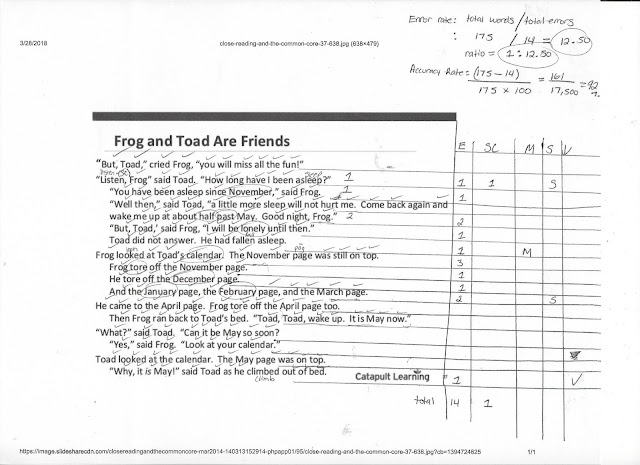Week #6/ Assignment # 3 Phonics Lesson Plan
Candidate’s Name: Angelicia Ming
Grade Level: Kindergarten
Title of the lesson: Make a Word using onset &
rimes
Length of the lesson: 30 min
|
Central focus of the lesson (The central focus should
align with the CCSS/content standards and support students to develop an
essential literacy strategy and requisite skills for comprehending or
composing texts in meaningful contexts)
The “onset” is the initial phonological
unit of the word ( B in Bat) and the “rime” is the string of letters that
usually follow the vowel and consonants at the end of the word (-at in Bat).
Not all words have onsets. Teaching beginning readers about inset and rime
helps them to recognize common chunks in a words where this will aid in
decoding new words when reading and spelling words when writing.
Key questions:
● what do you want your
students to learn?
I want my students to be able to identify
the onset and rime in each word presented
● what are the important
understandings and core concepts you want students to develop within the
learning segment?
I want students to understand the
phonological unit of a word where they can be able to decode new words and
spell words when writing and increase their literacy skills.
1)
Phonics
2)
Decoding
3)
Phonemic Awareness
4)
Letter Sounds
|
|
Knowledge of students to inform teaching (prior knowledge/prerequisite skills and
personal/cultural/community assets)
Prior knowledge includes syllables, sound
blending, vowels, letters and alphabet, letter-sound correspondence, rhymes,
sight words, and consonants.
Motivation for literacy.
|
|
Know and apply grade-level phonics and word analysis
skills in decoding words.
Demonstrate basic knowledge of one-to-one
letter-sound correspondences producing the primary sound or many of the most
frequent sounds for each consonant.
Associate the long and short sounds with the common
spellings (graphemes) for the five major vowels.
|
|
Support literacy development through language (academic language)
● Identify one language
function (i.e. analyze, argue, categorize, compare/contrast, describe,
explain, interpret, predict, question, retell, summarize or another one
appropriate for your learning segment)
1) Increase literacy skills
2) Reading
3) Spelling acquisition
4) Foundation of spelling strategies
5) describe word patterns
Vocabulary
● Students will blend onsets
with rimes and listen to see if the blend is a word.
|
|
Learning objectives
1)
Student will blend onset
with rimes to see if blend is a word
2)
Student will distinguish between
an onset and rime in words selected
3)
Students will learn the correspondence
between letter and sound in words
|
|
Formal and informal assessment (including type[s] of assessment and
what is being assessed)
Students will be assessed by completing worksheets that are
composed of words. Students will separate the onset and rimes in addition of
creating a blend from the word and sounding out the word to see f the blend
works aloud. Students will be able to create words from a blend of the inset
and rime. ELL students will use audio to hear the onset and rimes of words.
|
|
Instructional procedure:
1) Students will be given the definition of
an onset and rime
2) Students will be given models by instructor
how to distinguish between an inset and rime
3) Students will then look at a video on
onset and rime.
4) Students will be asked as a group to distinguish
the onset and rime together using examples presented by the instructor as a
class.
5) Students will then break into pairs and
each pair will be given a stack on index cards that have an onset and rime on
each card shuffled in a stack.
6) Using the worksheet provided, students
will then have to create a word using the onset and rime by putting together the
combination to create a blend.
7) After creating a list of blends on the
worksheet each pair will then tell the class their blends aloud once every
pair is finished creating their blends in a timely manner.

Accommodations and modifications:
ELLs/struggling readers will be given an activity they can play on an ipad
that relates to selecting the onset and rime and then creating a blend. https://video.search.yahoo.com/search/video;_ylt=A0LEVyvaRp5a_m8AxBtXNyoA;_ylu=X3oDMTE0NTg2bDUxBGNvbG8DYmYxBHBvcwMxBHZ0aWQDQjI5NDRfMQRzZWMDcGl2cw--?p=onset+and+rhyme+computer+games&fr2=piv-web&fr=mcafee#id=10&vid=3798e083b3a1b0c17142a8939608485a&action=view
|
|
Instructional resources and materials used to engage students
in learning.
|
|
Reflection
● Did your instruction
support learning for the whole class and the students who need great support
or challenge? Yes
● What changes would you
make to support better student learning of the central focus?
I would include a game in addition to make
the learning segment more engaging. I would also briefly discuss the vowel
sounds from previous lessons.
● Why do you think these
changes would improve student learning? Support your explanation from
evidence of research and/or theory.
Engaging students in activities by
interest are important in keeping the student on task and motivated to learn
more.
|
Dr. Hui-Yin Hsu Spring 2014

Comments
Post a Comment